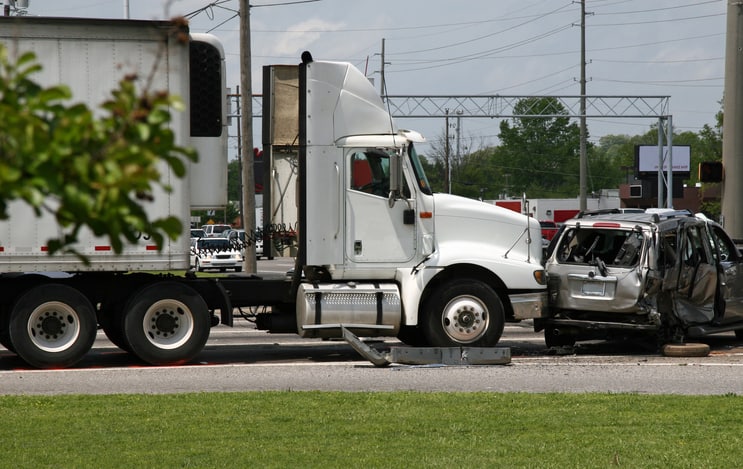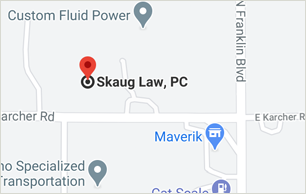What are Truck Accident Lawsuits?
Last updated Friday, June 2nd, 2023

Truck accident lawsuits are the result of an accident involving a commercial truck and a passenger vehicle.
Even though motor vehicle accidents happen every day, an accident involving a large commercial vehicle can be much more serious and complicated. Because of the large weight and size differences between a big rig and a personal passenger vehicle, the possibility of severe injuries and large property damages from a truck crash increase significantly.
Large trucks are on the road every day… We all see them whenever we’re on the road ourselves. But what is considered to be a large commercial vehicle?
A vehicle over 10,000 lbs. is considered to be a commercial vehicle. A commercial truck can also be known by other names, such as a semi-truck, 18-wheeler, over the road rig, tractor-trailers, Mack trucks or even dump trucks. These vehicles must operate by specific laws due to the fact that they are large and can cause significant harm if involved in a wreck or accident.
As the victim of a trucking accident, you may be facing monumental injuries and losses that are life-changing. You may find yourself in the position of having to figure out how to begin this new life and asking the following questions:
- What is the first step?
- Do I need to hire an attorney?
- Can I afford to hire an attorney?
- Which law firm is the best for my situation?
You need help from a lawyer that understands the many steps and processes involved in truck accident lawsuits. As a law firm that specializes in Truck Accident cases, we know the questions to ask and the steps to take to get you compensation for your pain and loss.
Having an experienced crash lawyer with years of knowledge and know-how is the key to navigating this confusing legal process. We offer years of valuable legal experience and we’re available to you in minutes.
Who Can Be Legally Responsible in a Trucking Accident?
The driver of the truck would seem like the obvious party at fault for the accident, but there are also several other parties that can be held financially liable for a semi-truck accident. The award you receive could come from one party or several, depending upon which party or parties proven to be at fault.
Other possible liable parties include:
- The truck driver
- The driver of the personal vehicle
- The truck driver’s employer
- The over the road trucking company
- The owner of the commercial rig
- The owner and loader of the cargo
- The trucking maintenance company
- The truck manufacturer or part manufacturer
- Or others.
Determining who is at fault can be a difficult and complex process. There are many things to consider such as:
- Did the trucking company hire a qualified driver?
- Was the driver impaired in any way?
- Was the truck in good mechanical condition?
Get Your Free Injury Case Review
What is Truck Driver Liability?
The truck driver has a big responsibility in making sure the truck is in safe working order. He or she often carries some responsibility for the accident, but not always. In some cases, the driver is not financially responsible for damages unless the crash was intentional.
Truck driver liability includes negligence such as speeding, distracted driving, driving under the influence of drugs or alcohol, or driver fatigue. Many truck drivers are also responsible for securing the load to the truck bed, which is a very important safety step. Securing the truck load properly cuts down on the possibility of the load shifting, which could cause a dangerous sway while moving.
Is the Trucking Company Liable in an Accident?
The trucking company can, and often is, held financially liable when an accident causes damages or injury. The truck companies are responsible for maintaining the rigs so that they are mechanically sound and safe to be on the road. The truck companies are also responsible for making sure that the drivers it employs have been trained properly and have the necessary licensing and qualifications to operate safely.
Is the Truck Driver an Employee or a Contractor?
Semi drivers can be legally classified as either independent contractors or company employees, and it is sometimes difficult to determine the true status. Many trucking companies prefer to refer to its drivers as “independent contractors” to protect the company from lawsuits if a wreck happens.
Having a good lawyer is the best way to determine the driver’s true employment status. This is important to determine because the compensation for an accident victim can vary greatly depending which is deemed at fault.
There are several factors that go into the classification, but the main determining factor is this: How much control does a driver have over their duties?
Below are a few factors that help determine whether a truck operator is an employee or contractor.
To be classified as an employee, the driver:
- Drives a truck owned by the company
- Does not have control over his/her schedule or when and where to pick up or drop off
- Has licensure kept under the company’s name
- Is not allowed to contract with other employers
To be classified as an independent contractor, the driver:
- Owns the truck
- Controls his/her own schedule
- Holds own licensure under his/her own name
- Is free to contract with other employers
How do Multiple Defendants Affect a Truck Accident Case?
When determining the fault in a truck accident case, more than one entity can be shown to be responsible. When there are multiple defendants, there are also multiple insurance companies. And when there are multiple defendants and insurance companies, often the possibility of a quick and easy settlement becomes difficult. Due to the disagreements between defendants, a case often goes to trial, removing the possibility of a quick and easy settlement for the victim.
The liable parties may be equally responsible for compensation, or may each have a different percentage of liability. It takes an experienced attorney to work through the process.
What are the Federal and State Trucking Regulations?
The United States Department of Transportation creates and enforces regulations for over the road trucking companies in an effort to regulate safe practices for truckers and trucking companies. Anyone that operates a large truck is required to follow the laws set forth by the federal government.
These specific rules are known as The Federal Motor Carrier Safety Regulations (FMCSR). These rules were put in place to regulate trucking safety laws from the federal level down. Information on the FMCSR rules are downloadable from the official FMCSR website.
These laws regulate topics such as:
- The number of hours a trucker is allowed to drive per day, called Hours of Service Rules
- The requirements regarding drug and alcohol testing
- Transporting hazardous materials
- Vehicle maintenance requirements
- As well as other aspects of truck safety
While the federal trucking regulations are the same for all, the state trucking regulations vary from state-to-state. An experienced attorney knows the individual state laws and will be able to help. We Can Help! Even though the process can be complex, our years of courtroom experience will give you the guidance you need to get through this difficult time in your life. Our team of professionals are here for you. Contact our team of experienced Boise truck accident lawyers, today.

